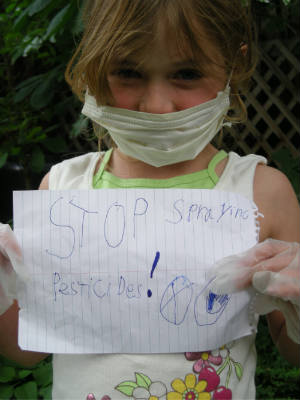
On Wednesday, Feb 20th, the Provincial Government issued a press release stating (among other things) that it was introducing changes to BC’s Integrated Pest Management Act (hat tip to Kathryn Seeley at the Canadian Cancer Society for directing my attention to this):
The proposed amendments to the Integrated Pest Management Act will give the Minister of Environment authority to make regulations that reduce the unnecessary use of pesticides for cosmetic purposes. The amendments take into account feedback following public consultation and input, as well as the work of the special committee. If passed, the amendments will provide authority for regulations requiring a licence for using most pesticides on landscaped private land, with some exceptions. The regulations are currently being developed. [Emphasis added]
 The important thing to take from this is that the goal of the government’s proposed cosmetic pesticide regulations is not a ban of the use of pesticides for cosmetic purposes, as West Coast, the Canadian Cancer Society, the David Suzuki Foundation and a wide coalition of other organizations have repeatedly asked for, and which a large majority of British Columbians support. Instead the government is going to require anyone who is using pesticides on their lawn to hire someone with a licence (i.e., a lawn care company).
The important thing to take from this is that the goal of the government’s proposed cosmetic pesticide regulations is not a ban of the use of pesticides for cosmetic purposes, as West Coast, the Canadian Cancer Society, the David Suzuki Foundation and a wide coalition of other organizations have repeatedly asked for, and which a large majority of British Columbians support. Instead the government is going to require anyone who is using pesticides on their lawn to hire someone with a licence (i.e., a lawn care company).
The “special committee” referred to in the quote was the Legislative Committee appointed by Premier Clark, the government members of which recommended a “let them hire lawn care specialists” approach, while pooh-poohing the concerns of anyone looking for a full ban on cosmetic pesticides. After the Committee issued its report, we expressed hope that the BC government might still choose to proceed with a ban, in keeping with the Premier’s own promise to ban such pesticide use:
"I've supported [a ban on cosmetic pesticides] for years now," she said in a scrum with reporters at the legislature. "We are going to do it."
Incredibly, the government is claiming (in another press release) that this weakened approach reflects the input of the 8,000 people who appeared before the special committee – most of whom strongly preferred a ban.
The Opposition NDP has consistently pressed for a full ban on cosmetic pesticide use, as has the Green Party. So there’s every possibility that this could become an election issue in the near future. And, frankly, I don’t see the government’s promise to require home owners to hire licensed applicators is going to satisfy anyone but the licensed applicators and the pesticide companies.
Just to note: The actual amendments to the Integrated Pest Management Act contained in the government’s Miscellaneous Amendments Act are very minor – just increasing government’s flexibility in creating exceptions to requirements in its regulations (which it almost certainly already had the authority to do). Even without such amendments, the government already requires the landlords of “multi-residence buildings” to use licensed pesticide applicators, so it’s unclear why amendments should be required to implement a similar regime for cosmetic pesticide use. In our view, it is misleading to characterize these changes as giving the Minister of Environment authority to regulate the unnecessary use of pesticides for cosmetic purposes – the Minister already has this authority.
By Andrew Gage, Staff Lawyer
Photo courtesy of Kerry Bokenfohr